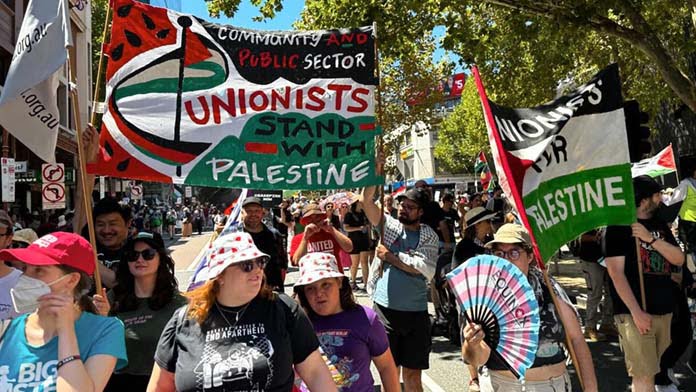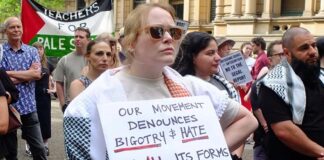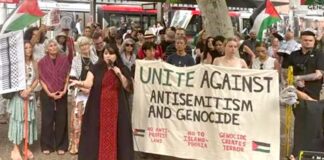Chris Breen examines why most union leaders still haven’t mobilised their members to support Palestine, despite the efforts at rank-and-file action
Israel and its partners in genocide are more isolated than ever.
Mass protests and student encampments have lit a spark of growing consciousness about the genocide and Australia’s role it, but it is workers who have the industrial power to make calls to stop military trade with Israel a reality.
Although still weak in many respects, the ACTU peak union body has issued a statement calling for an end to all military trade with Israel. The union movement is on record opposing companies in Australia doing work on the F-35 fighter jets being used in Gaza. The CFMEU has called for Australia to immediately ban military trade with Israel, including dual-use devices.
Rank-and-file groups for Palestine have sprung up in dozens of unions. Many unions have had official contingents at the rallies for Palestine, and Maritime Union officials were arrested at Port Botany in protests to blockade Israeli ZIM ships.
But why have official calls to end military trade taken so long? And why are unions yet to seriously mobilise their membership for the rallies for Palestine, let alone take industrial action to enforce bans on weapons trade with Israel?
The extent of horror in Gaza has been clear from October, and certainly since the “plausible genocide” ruling by the International Court of Justice on 26 January.
Yet most union leaders have been dragging their feet and blocking action.
To see why it is important to understand that union leaders occupy a distinct social position that encourages conservatism. The paid officials who run the unions are a negotiating layer, removed from the pressures of the workplace. Senior officials are usually on substantially better wages and conditions than the workers they represent.
To keep their positions they have to be somewhat responsive to workers’ demands, since they can ultimately be removed by their members in union elections. To have any bargaining power, they need to be prepared at least to threaten industrial action on occasion. But their role as professional negotiators means they see their rightful place as at the bargaining table rather than the picket line.
There is a difference between left and right officials, especially where officials have recently been elected out of a wave of strike action.
The NSW leadership of the Maritime Union, who are on the left, have put their bodies on the line in the fight to shut down ZIM shipping.
On the other hand, the NSW secretary of the Health Services Union, Gerard Hayes from the Labor Right, met the Israeli ambassador. He claimed that the union didn’t want to take a side and supported a two-state solution. But meeting the ambassador while genocide is taking place was taking a side.
Hayes’ statement also condemned “the savage Hamas attacks on Israeli civilians” while merely calling on Israel to be “be more focused” on preventing civilian casualties.
But all officials can come to see strikes as a nuisance and the mobilisation of workers, and rank-and-file democracy, as a threat to their position and the resources of the union, especially when anti-union laws carry heavy fines.
The union movement today is also far weaker than in the past. Union militancy has been in retreat for several decades. Far fewer unions take serious industrial action even around their own immediate demands for wages and conditions, let alone over wider political issues like Palestine.
This often leads to a strategy of lobbying Labor governments or employers to deliver, rather than mobilising members. Some union leaders have been reluctant to call out state or federal Labor governments’ complicity in Israel’s genocide for fear of disrupting what they perceive as a cosy bargaining relationship.
Trade union leaders set up the Labor Party. Today union leaders still control half the votes at Labor Party conferences and often climb into the ranks of Labor MPs.
Because union leaders look to Labor to form the federal government, they associate with the “national interest” of Australia’s rulers. That can act as a brake on mobilising around issues like Gaza, that raise radical and embarrassing questions about the role of the Australian state.
Ultra-leftism
Union officials’ conservatism means they have held back from taking a stronger stand over Gaza. But their response also shows they are not yet under sufficient pressure from rank-and-file union members to force them to act on the issue.
Given the limited, vacillating and occasionally completely reactionary positions of some union leaders on Gaza, it is sometimes tempting for activists to simply denounce union leaders or to ask if they would be better off organising outside the unions. But this would leave activists cut off from a key audience. Despite union decline, there are still 1.4 million union members in Australia today.
Despite many bureaucratic restrictions, unions still provide some of the only democratic structures that allow workers to make arguments that counter the ruling class distortions. At the Australian Nurses and Midwives Federation (ANMF) delegates conference in Victoria at the end of June, ANMF for Palestine members argued for the union to join the Boycott Divestment and Sanctions campaign against Israel. The motion lost narrowly, but in the debate and at the stall that followed, the pro-Palestine rank-and-file members made important arguments directly to workplace delegates about why it’s not antisemitic to oppose Israel, and signed up new union activists to the campaign.
The possibility of any serious workers’ industrial action for Gaza relies on winning over large numbers of those union members to action. A radical minority cannot take successful industrial action on its own. Union bans at the ports, for example, would require the support of the majority of the workforce.
Unlike Labor Party leaders, workers, whatever their current political consciousness, have no interest in maintaining imperialism or covering up genocide. They can be won to supporting Palestine. That then forces union officials to either give some voice to Palestine or to lose influence among radicalising members of their unions.
Successes
Pro-Palestine unionists working within the unions are gaining wider support, showing how organising by union rank-and-file members can shift union leaders into some forms of action. This requires working with union leaders and officials where possible and organising against them when it’s not.
Activists in Teachers and School Staff for Palestine pushed the NSW Teachers Federation to bring its flags to Palestine rallies, when it originally refused on the basis that they didn’t want to be smeared as antisemitic.
Teacher activists are mobilising to defend the right to discuss Palestine in schools and in NSW successfully moved motions for the union to back the wearing of the keffiyeh at work. In Victoria, rank-and-file teacher action has meant the union leaders are taking their own pro-Palestine motions to the state conference in July.
There is still much more to be done. While the union has responded to pressure it has also sought to limit that response. For instance, the NSWTF brings union flags to most rallies for Palestine but limits the emails it sends to members to the hundred or so in the Peace Special Interest Group.
NSWTF officials organised well publicised public forums about the Voice in most teachers’ associations but haven’t done so about Gaza. The Voice, a symbolic move designed to avoid real change, was pushing what ALP leaders wanted while Gaza pushes hard against them.
At the University of Sydney, nearly 350 NTEU members packed into a meeting to consider a motion to boycott Israeli universities, which passed with 93 per cent voting in favour despite officials often arguing that “members don’t care about Palestine”.
In Melbourne, university staff and NTEU members mobilised to defend the Melbourne University student occupation when management threatened to bring in police.
On May Day, some Australian Services Union members in Melbourne took 30-minute stopwork action to call on their employers in the community and not-for-profit sector to step up advocacy for Palestine.
Proud history
Some union leaders defend their inaction by arguing that members are only interested in ‘bread and butter’ issues, and that forcing members to take a position on politics will create division in the union.
But unions have a proud history of building power by standing against apartheid and war.
On 25 October 1990, Nelson Mandela delivered a thank you speech to the Australian union movement at Melbourne Town Hall.
He said, “I well remember that the labour movement of this country [Australia] was among the very first, if not the first, to take solidarity action in line with the people of South Africa in the course of their struggle”.
All the most powerful mass movements in Australian history have involved significant industrial action. The movement against the war in Vietnam saw workers economically disrupting the war machine. Maritime unions first refused to load ships with supplies for the war in Vietnam. Then they banned work on all US ships.
To get to that point required much political argument and agitation. The Moratoriums (political strikes and rallies) against the war, which came after years of organising, involved teachers, university staff and construction workers downing tools to stop the war.
These political mobilisations were not distractions; they fed the union movements’ combativity, increasing strikes, and building direct challenges to anti-strike laws.
To build the power that can disrupt our rulers support for, and military ties with, Israel means rebuilding this social justice unionism.
Union power today is at a far lower ebb. There are now anti-union laws that impose enormous restrictions on when unions can take industrial action and ban strikes over political issues, with huge fines for unions that take any unlawful strike action.
But union mobilisation and industrial action in support of Palestine is the only way the movement can wield the power needed to break Australian ties with Israel. We need to break the law to stop the war.






